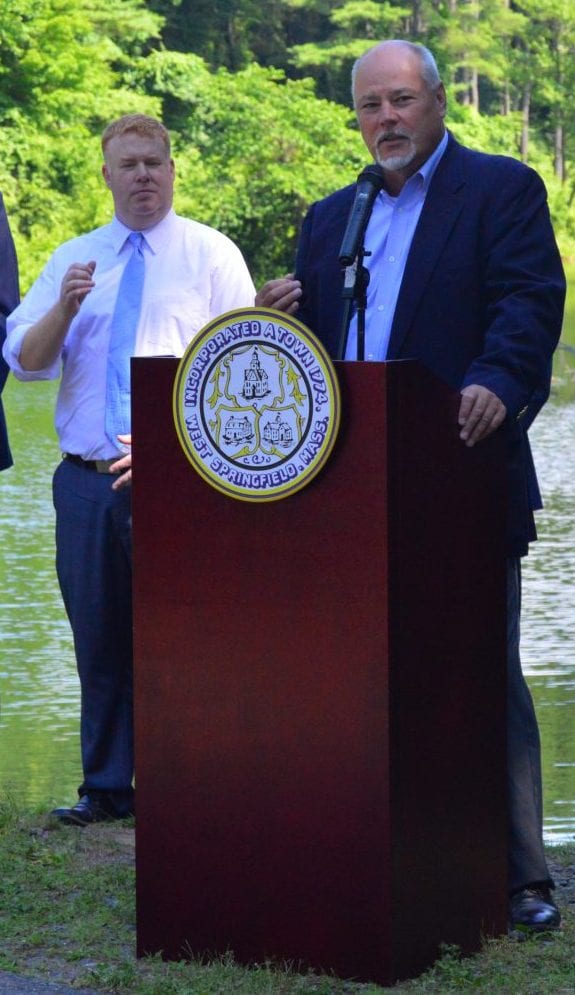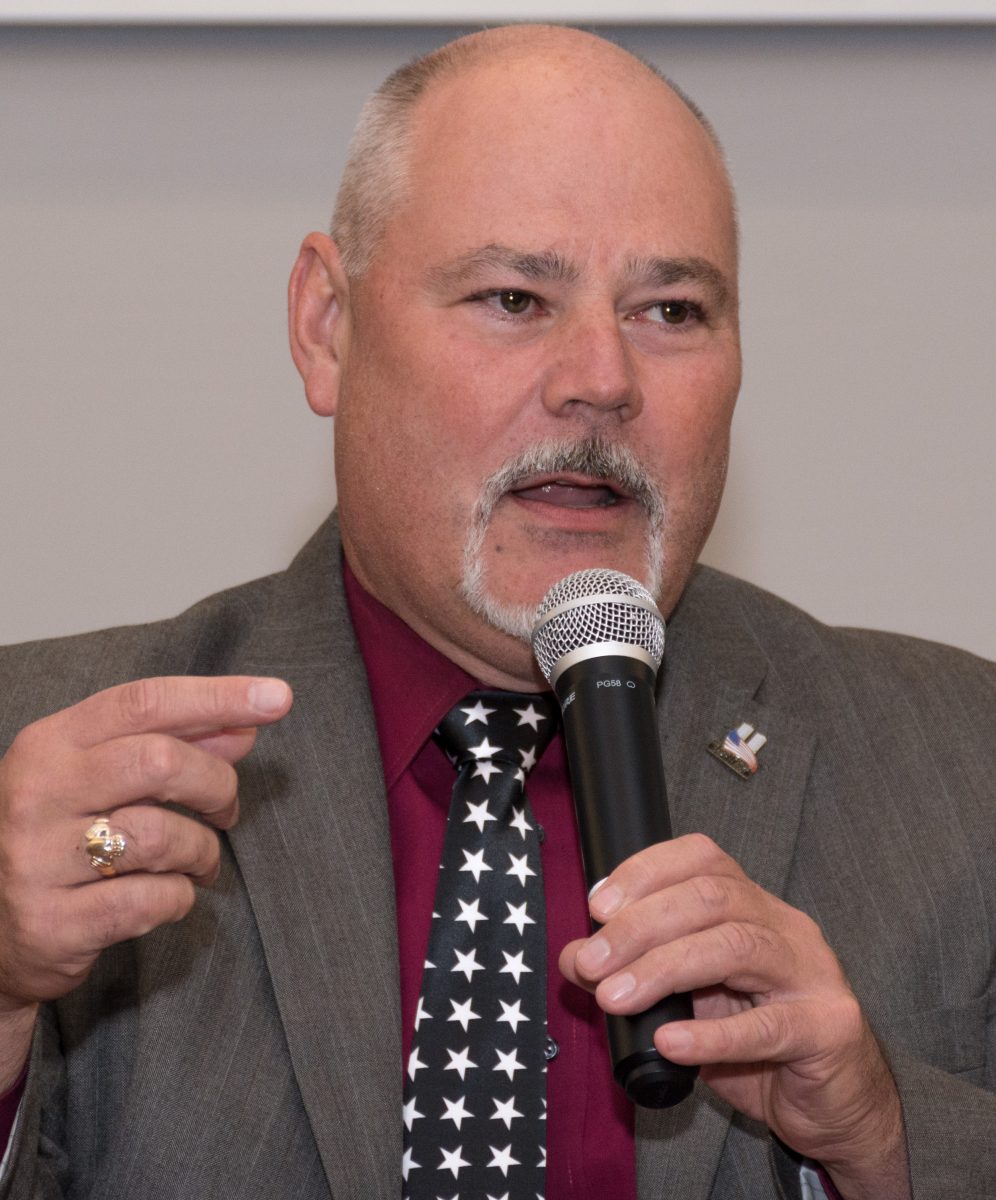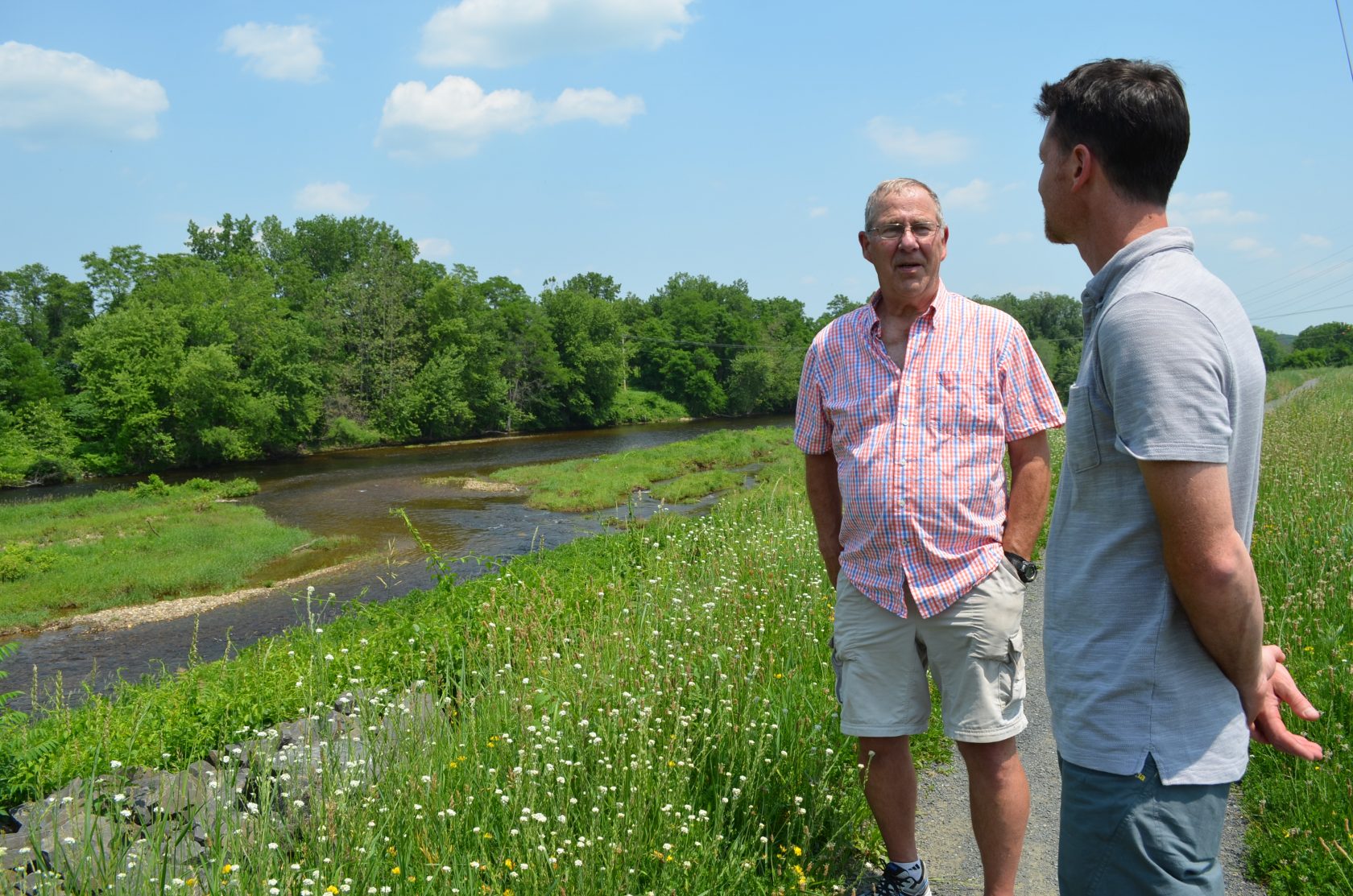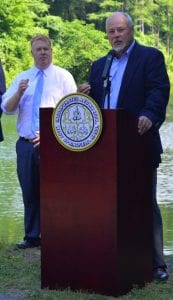
Mayor Brian P. Sullivan at the announcement of the Tri-City Carbon Sequestration Program Monday. (Photo by Peter Currier)
WEST SPRINGFIELD- Mayor Brian P. Sullivan and other Westfield dignitaries joined West Springfield and Holyoke officials for the announcement of the Tri-City Carbon Sequestration Program Monday at the Bear Hole Watershed, which is abutted by all three communities.
The announcement was led by West Springfield Mayor William Reichelt. He said that the program has been in the making for five years and was first proposed by former West Springfield Mayor Edward Sullivan. The program is meant to preserve the trees and environment in the watershed and earn carbon credits for the three cities.
A carbon credit is the equivalent of removing one ton of carbon dioxide (CO2) from the atmosphere. They can be sold to companies who are working on projects that may cause more carbon emissions, essentially granting them the ability to emit while the three communities make efforts to remove it from the atmosphere.
“We hired a company called Bluesource that went through all of our forests in Holyoke and Westfield and verified our credits. Now we’re at the stage where everything is verified and all of the I’s are dotted and T’s are crossed,” said Reichelt, “We’re going to sell credits. The three communities over 10 years will raise more than $2 million.”
Edward Sullivan, who started the project in 2015 alongside Conservation Officer Mark Noonan, said that allowing the trees to grow rather than being cut down or replaced will increase the amount of carbon that is removed from the atmosphere. Trees, in a sense, respirate like humans do in that there is an exchange of CO2 and oxygen. When trees are undergoing photosynthesis, they will absorb CO2 and release oxygen during the day. When trees respirate, they release CO2 and absorb oxygen. When they absorb CO2, they hold on to some of it, creating a net loss of CO2 from the atmosphere.
“By committing to maintain forest CO2 stocks above the regional baseline, this program will provide significant climate benefits through carbon sequestration, while at the same time generating revenues to maintain these pristine areas,” said Reichelt in a statement last week, “We will be preserving our urban forests for future generations, reducing carbon dioxide levels and improving air quality in Western Massachusetts.”
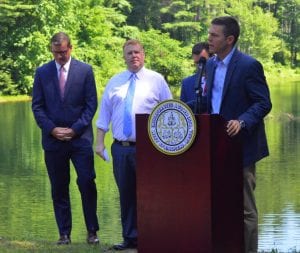
State Rep. John Velis speaks during a press conference at Bear Hole in West Springfield July 15, 2019. (Photo by Peter Currier)
In order to begin the project, the state representatives from the three cities had to secure an earmark of $100,000. West Springfield state Rep. Michael Finn successfully advocated to the Massachusetts State Legislature for the funds. He noted that state Rep. John Velis, state Rep.Aaron Vega, state Sen. Donald F. Humason Jr. and state Sen. James Welch were essential in getting the earmark approved. The rest of the project was funded by the sale of carbon credits.
“When Mayor [Ed] Sullivan came to us and said, ‘carbon sequestration’ we thought he was joking, and we did not know what that meant,” said Welch, “When he laid it out to us, in the back of my mind was that we would be preserving this area for generations to come.”
Velis said that he is impressed with the collaboration between the governments of the state and the three cities.
“This is government at work. This is everybody working together on different levels,” said Velis, “I’m just really happy to be here and be a part of this process and to have played a very small part of it.”
Mayor Brian P. Sullivan said that he was only involved in the later stages of the program’s formation, as much of it was started under former Mayor Daniel M. Knapik.
“It’s actually a project with a purpose. We’re conserving trees that are taking CO2 out of the air in the three cities. And isn’t it special that it’s Western Massachusetts that’s the first one on the map all over the country,” said Mayor Sullivan, “It’s a topic of conversation especially in western Massachusetts.”
Mayor Sullivan noted that West Springfield, Holyoke, and Westfeld have begun initiatives to replace their fleet of city vehicles with electric cars. He added that the revenue generated by the sale of these carbon credits could be used to fund the electric car program.
He also pointed out Westfield Ward 1 City Councilor Mary Ann Babinski, who he said is the leading city councilor on climate issues. He noted that Babinski has been working on related boards and commissions throughout the state to keep him in the loop on these types of projects.
“With the money that comes in, we don’t know exactly what we’re going to do with it, but we’re going to use it for more projects like this,” said Mayor Sullivan.
He later said that Babinski requested that some of the funds be used to create alternative sources for the city’s drinking water.
Following the remarks by each official, they were all presented with certificates with an equivalent value of one carbon credit each. The value of a single credit is currently close to $10.

